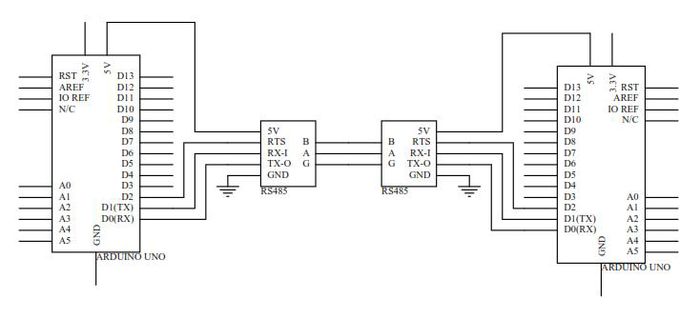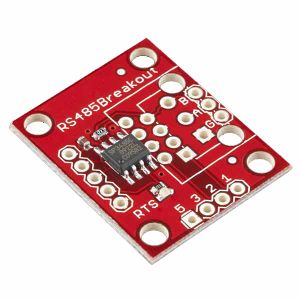Difference between revisions of "RS-485 Breakout"
From Geeetech Wiki
(→Usage) |
(→How to buy) |
||
| (3 intermediate revisions by the same user not shown) | |||
| Line 1: | Line 1: | ||
==Overview== | ==Overview== | ||
| + | [[File:RS485-01.jpg|300px]] | ||
| + | |||
This is a breakout board for the RS-485 transceiver IC, which will convert a UART serial signal to RS-485. This chip is a half-duplex transceiver, so it can only communicate one way at a time, but it can reach transmission speeds of up to 2.5Mbps. This board requires a very low amount of power and can operate from a single +5VDC supply. | This is a breakout board for the RS-485 transceiver IC, which will convert a UART serial signal to RS-485. This chip is a half-duplex transceiver, so it can only communicate one way at a time, but it can reach transmission speeds of up to 2.5Mbps. This board requires a very low amount of power and can operate from a single +5VDC supply. | ||
This breakout board includes the SP3485 RS-485 transceiver, filter capacitor. We've broken out the RS-485 output to three different connections: (1) an RJ-45 connector, (2) a 3-pin 3.55mm screw terminal, and (3) a 3-pin 0.1" pitch header | This breakout board includes the SP3485 RS-485 transceiver, filter capacitor. We've broken out the RS-485 output to three different connections: (1) an RJ-45 connector, (2) a 3-pin 3.55mm screw terminal, and (3) a 3-pin 0.1" pitch header | ||
| − | |||
==Features== | ==Features== | ||
| Line 17: | Line 18: | ||
==Usage== | ==Usage== | ||
Here is an example below illustrates how to transimit and receive data via RS-485 signal. | Here is an example below illustrates how to transimit and receive data via RS-485 signal. | ||
| + | [[File:RS485 example.jpg|700px]] | ||
===RS485 Transmitter=== | ===RS485 Transmitter=== | ||
| Line 50: | Line 52: | ||
{ | { | ||
// receive data | // receive data | ||
| − | digitalWrite(EN, LOW); | + | digitalWrite(EN, LOW); |
val = Serial.read(); | val = Serial.read(); | ||
if (-1 != val) { | if (-1 != val) { | ||
| Line 61: | Line 63: | ||
} | } | ||
} | } | ||
| + | |||
| + | ==Document== | ||
| + | ==How to buy== | ||
| + | Click here to buy [http://www.geeetech.com/uart-to-rs485-breakout-p-619.html RS-485 Breakout] | ||
Latest revision as of 01:22, 22 January 2013
Contents
Overview
This is a breakout board for the RS-485 transceiver IC, which will convert a UART serial signal to RS-485. This chip is a half-duplex transceiver, so it can only communicate one way at a time, but it can reach transmission speeds of up to 2.5Mbps. This board requires a very low amount of power and can operate from a single +5VDC supply.
This breakout board includes the SP3485 RS-485 transceiver, filter capacitor. We've broken out the RS-485 output to three different connections: (1) an RJ-45 connector, (2) a 3-pin 3.55mm screw terminal, and (3) a 3-pin 0.1" pitch header
Features
- Fully equipped with SP3485 RS-485 transceiver and supporting components
- Operates from a single +5V supply
- Interoperable with +5.0V logic
- RS-485 input/output broken out to RJ-45 connector, 3.5mm screw terminal, and 0.1" pitch header
- Driver/Receiver Enable connected to RTS line
- -7V to +12V Common-Mode Input Voltage Range
- Allows up to 32 transceivers on the serial bus
- Driver Output Short-Circuit Protection
Usage
Here is an example below illustrates how to transimit and receive data via RS-485 signal.

RS485 Transmitter
int EN = 2;
void setup()
{
pinMode(EN, OUTPUT);
Serial.begin(19200);
}
void loop()
{
// send data
digitalWrite(EN, HIGH);/
Serial.print('A');
Serial.print('B');
delay(1000);
}
RS485 Receiver
int ledPin = 13;
int EN = 2;
int val;
void setup()
{
pinMode(ledPin, OUTPUT);
pinMode(EN, OUTPUT);
Serial.begin(19200);
}
void loop()
{
// receive data
digitalWrite(EN, LOW);
val = Serial.read();
if (-1 != val) {
if ('A' == val) {
digitalWrite(ledPin, HIGH);
delay(500);
digitalWrite(ledPin, LOW);
delay(500);
}
}
}
Document
How to buy
Click here to buy RS-485 Breakout
